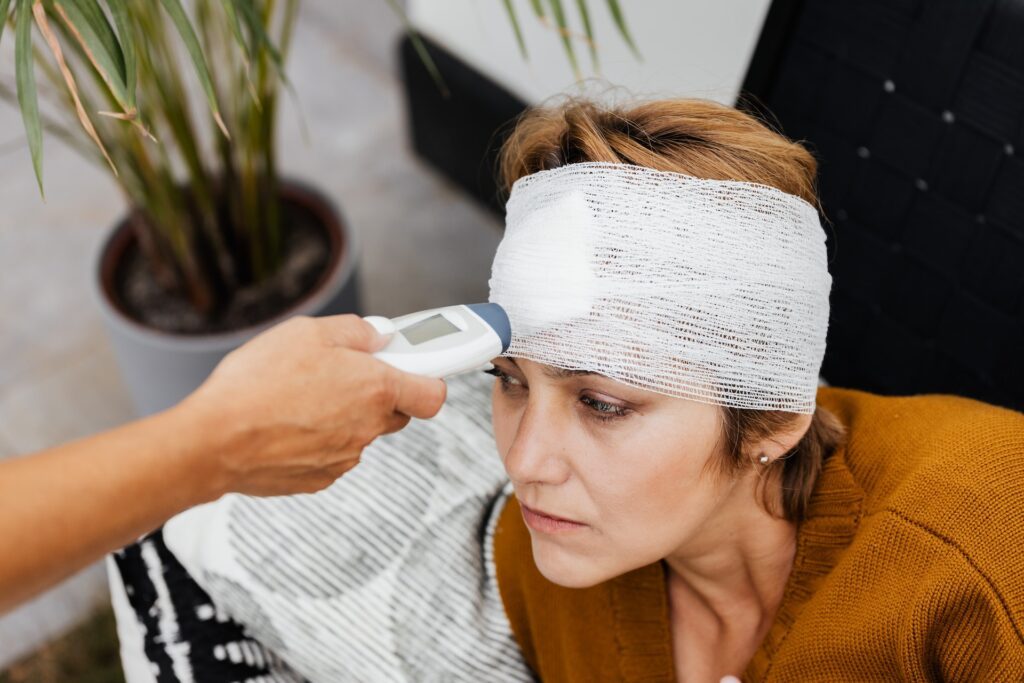Feeling sore after being involved in an auto accident is often not a major cause of concern. But it won’t also hurt to get a proper medical evaluation to rule out any hidden injuries or complications.
In 2021, the National Safety Council (NSC) reported 5.4 million medically consulted injuries in motor vehicle accidents. These injuries reached a level of severity that warranted consultation with a medical professional.
Car accident injuries’ severity can vary from minor bruises to life-threatening conditions, like spinal cord injuries and internal organ damage. After sustaining an injury, car accident victims will likely experience soreness and other symptoms.
But how do you know when soreness is a potential indication of a more serious injury? A medical professional is valuable in identifying underlying injuries if you feel sore after a car accident. Additionally, a car accident attorney is crucial to obtain financial compensation for your injury and pain.
The Personal Injury Center has various resources to help you effectively deal with the aftermath of a car accident. Browse through our online repository and access a wide range of informative materials that will help you better understand your rights.
Key Takeaways
|
Most Common Injuries Causing Soreness After a Car Accident


The human body undergoes significant physical trauma in an auto accident, even in minor collisions. The impact force can throw you around the vehicle, subjecting different parts of your body to trauma.
Depending on the impact’s speed and direction, you may hit the steering wheel, dashboard, or windows, resulting in minor to severe injuries. Similarly, every part of your body will likely feel sore and in pain after a car crash.
It’s important to watch out for any signs and symptoms of non-visible injuries following a car crash. Below are the types of injuries that commonly cause victims to feel sore after a car accident, along with their associated symptoms.
Soft tissue injuries
Sudden trauma from an auto accident can injure the body’s soft tissues, including ligaments, muscles, and tendons. When soft tissue damage occurs, it’s typical to experience immediate soreness accompanied by sudden or delayed swelling.
Injured victims may also suffer from stiffness due to the trauma and swelling. Bruising may also manifest within 24-48 hours after the accident. Moderate to severe soft tissue injuries may cause significant instability, particularly in weight-bearing joints like the hip, knee, and ankle.
It’s not common for soft tissue injuries to be fatal. But though most cases heal without complications, restoring mobility from a soft tissue injury may require extensive treatment, therapy, and medication.
Moreover, the healing process for a soft tissue injury depends on several factors. These factors may include the injured victim’s age as well as the injury’s type and severity. Sprains, strains, and contusions or bruises are among the most frequent soft tissue injuries sustained in car accidents.
Neck injuries
The violent force of a collision can abruptly jerk your head in various directions, even when the crash is minor. When wearing a seatbelt, your neck and body will remain stationary while your head is subjected to back-and-forth motion.
This sudden movement can result in significant stress and strain on your cervical spine or neck, which consists of seven vertebrates. Muscle tears in the joints connecting the neck’s vertebrae can cause soreness and discomfort. It may also lead to instability of the spine in more severe cases.
Symptoms of a neck injury commonly involve neck pain, headache, dizziness, shoulder pain, and limited range of motion. Typically, neck pain subsides within a few weeks to a month. But some may persist much longer and require surgical interventions or long-term care in extreme cases.
Whiplash is among the most prevalent car accident neck injuries, specifically after rear-end collisions. Around 50 percent of whiplash patients experience chronic whiplash-associated disorder (WAD) after sustaining an initial injury. WAD refers to clinical manifestations that describe an injury to the neck.
Back injuries
The sudden jolt in a car accident can cause overextension of ligaments, tendons, and muscles in your back. This overstretching can injure your back’s bones, joints, muscles, or nerves, resulting in discomfort and pain that may be constant or worsen with movement.
Any region of the back can be susceptible to injuries, but most often, they occur in the lower back. Low back pain symptoms may manifest as sharp, dull, aching, or burning sensations that radiate into the buttocks, hips, or legs.
Although less common, upper back pain is associated with a traumatic injury like an auto accident. The high-energy trauma from a car collision can throw you against the sides of a vehicle and fracture your thoracic spine or upper back.
After sustaining fractured vertebrae, you’ll likely experience sudden and intense pain accompanied by bruising and swelling. Fractured vertebrae usually mend without complications. But some may need surgical intervention if the vertebrae are unstable and the spinal cord is compressed.
A herniated disc is another type of back injury frequently encountered in a car crash. The disc’s outer shell in each vertebra ruptures, causing a gel-like inner substance to push through the crack. This may cause pinched nerves and debilitating symptoms like pain, numbness, and tingling.
Spinal cord injuries
The spinal column serves as the primary support for the body and a protective barrier for the spinal cord. It’s highly susceptible to injury during a car crash. The excessive forces and movements caused by a collision can stretch the spine beyond its normal range, leading to significant injury.
The spine comprises the neck, upper back, or lower back. Any damage to these structures after a collision can result in a spinal cord injury. Car accident victims may experience soreness, stiffness, reduced range of motion, and nerve pain for months or years.
Since the spinal cord facilitates communication between the brain and body, it may lead to partial or permanent paralysis if severely injured. That’s why immediate medical evaluation is crucial if you experience numbness, muscle spasms, and localized or radiating back pain after a car accident.
Traumatic brain injuries
The impact force may cause an accident victim’s head to strike a steering wheel, dashboard, or other solid object. During a collision, an object may penetrate the skull, or the brain may forcefully move back and forth, causing traumatic brain injuries (TBIs).
Mild cases of a TBI may affect the brain cells temporarily. But more severe injuries can lead to blood vessel tears, bruising of brain tissue, and nerve fiber damage. Such types of injuries can have long-term complications or the potential to be fatal.
Headaches and neck pain are the most frequent types of pain after sustaining a TBI. Injured victims may also experience loss of balance, memory lapses, difficulty concentrating, and other physical or psychological symptoms.
It’s crucial to highlight that TBI often has delayed symptoms or is mistakenly attributed to other car accident-related injuries. Accident victims may not show visible physical signs of injury, making it challenging to diagnose. Even advanced neuroimaging techniques may fail to detect TBI.
Internal injuries
During a car crash, different parts of your body can suffer internal injuries, whether you’re thrown out from the vehicle or remain in the seat. These injuries can be extremely dangerous as they may not show noticeable symptoms.
Internal bleeding and damage to internal organs, such as the liver, spleen, pancreas, gallbladder, and kidneys, may not manifest outward signs of swelling and redness. Most often, they don’t produce apparent changes in the stool.
Due to a lack of symptoms, internal injuries can easily go undetected without a medical examination. As an aftermath, they can present more catastrophic dangers to the injured victims and quickly develop into more life-threatening conditions.
Still, there are common symptoms of impact-related internal injuries that you must watch out for after a car accident. These may include abdominal pain, shortness of breath, gastrointestinal problems, and sudden dizziness.
5 Steps To Help You Deal With Soreness After a Car Accident


Even if you walk away without visible injuries, car accidents can leave you with sudden or delayed pain. Remember that you may not immediately perceive the full extent of your injury right after the incident.
Knowing how to deal with soreness after a car crash is crucial for your physical and financial recovery. You’ll need care and support to recover from potential harm and losses.
Take the following steps to prevent further complications when experiencing soreness or discomfort after a car accident.
1. Obtain prompt medical care
You can be severely injured after an auto accident without realizing it. Even seemingly minor soreness can become a more severe problem if not diagnosed and treated promptly.
The adrenaline rush during traumatic situations like a car crash can significantly increase the body’s pain threshold. The reaction can mask the accident-related pain and provide a false sense of feeling fine, even if you sustained a serious injury. This makes obtaining prompt medical care more crucial, whether or not you feel pain or discover any apparent injury.
Medical professionals are skilled at recognizing subtle symptoms and injuries that victims might not associate with the crash. They will perform several tests, such as an X-ray and computed tomography (CT scan), to detect any underlying injury.
Immediately seeing a medical professional helps protect your health. You can ensure that typical soreness and other symptoms are accurately diagnosed. Likewise, a documented medical treatment and record helps establish a clear connection between the incident and your injuries.
It’s essential to remember that delaying medical attention can put your health and personal injury claim at risk. The
2. Adhere to the recommended treatment plan
Sticking to the treatment plan prescribed by the doctor is vital for managing soreness and promoting recovery.
Depending on your car accident injury, the medical professional may recommend physical therapy or chiropractic care to help manage your pain. It’s essential to adhere to the recommended treatment plan to prevent any future complications.
Insurance adjusters will use any gap in medical treatment to deny or devalue your claim. Failure to comply with the physician’s order will make the insurer suspicious that your injury wasn’t as severe as you claim.
Therefore, keeping appointments with the specialists referred by the doctor is vital to protect your rights to compensation.
3. Incorporate lifestyle changes
Lifestyle modifications are also essential in managing soreness after a car accident. For instance, reducing the consumption of foods that contribute to inflammation can be beneficial in alleviating accident-related pain.
Other lifestyle changes that injured victims can incorporate may include relaxation techniques and a consistent sleep schedule. Your physician can also help you design a safe workout plan and lifestyle adjustments based on your physical condition and recovery phase.
4. Document your symptoms in a journal
Documenting symptoms can be valuable when experiencing soreness after a car accident. It will help you track your recovery progress and how the accident and resulting injury affected your everyday life.
Additionally, this information can support your claim and prove that you deserve financial compensation for various damages. Here are some questions to aid injured victims in recording personal injury symptoms more effectively:
- What specific activities intensify or alleviate your accident-related pain?
- What physical limitations have you experienced during the healing process?
- Are you experiencing constant pain, or does it vary in intensity?
- How long is the duration of your pain, and when do you usually feel it?
5. Understand your legal rights
Having a good understanding of your rights will help you make well-informed decisions. Consulting with a car accident attorney is often optional, depending on the complexity of your case. But it’s the best way to navigate what you’re legally entitled to after sustaining an injury in a car crash.
A lawyer can clarify your legal right to damages. Generally, injured car accident victims can seek compensation if someone else’s negligent actions caused the accident and subsequent injury.
But you’ll need an attorney’s knowledge and assistance to prove fault and establish the negligent party’s liability. Likewise, you’ll need sufficient evidence to prove your pain and suffering after an injury.
A car accident lawyer is skilled at building solid proof for your personal injury case. They can also effectively negotiate with the
Moreover, they can fight for what you legally deserve in court before the statute of limitation expires. An attorney can file for the necessary legal paperwork on time to obtain the justice and compensation you’re eligible to recover.
Did you know?
Around 25 percent of whiplash patients experience significant distress or develop post-traumatic stress disorder (PTSD) after an auto accident.
Acquire Competent Legal Help at The Personal Injury Center
It’s common to feel sore after a car accident. But before dismissing any symptom as minor soreness, see a medical professional for an appropriate diagnosis and treatment. Soreness can signify serious injury, particularly when accompanied by other physical symptoms.
Your physician may recommend a treatment plan that can span several weeks or months, depending on the seriousness of your injury. Prolonged medical care will likely lead to substantial medical expenses that can affect your financial well-being.
Besides prioritizing your health, acquiring legal help is also crucial to secure proper compensation for your damages. At The Personal Injury Center, we offer a free consultation to assist injured victims by connecting them with an experienced attorney. Reach us today to discuss your legal needs in detail.
Ensure fair compensation for your car accident injuries. Visit The Personal Injury Center for high-quality legal assistance.
FAQs on Dealing With Soreness After a Car Accident
Is informing your insurance company after a car accident necessary?
Letting your insurer know about the incident is necessary, regardless of whether you caused the crash or were hit by another driver. Failing to notify your insurance company could result in the claim's denial. It's advisable to read your insurance policy to determine the specific timeframe for giving notice to the insurer.
How long does it often take to feel soreness after a car accident?
There is no fixed duration that applies to everyone. The time it takes to feel sore after a car accident varies depending on the specific injuries sustained and other circumstances of the accident. But typically, many people experience soreness for 24 to 48 hours, and it may last for up to six weeks or more.
What's the average settlement for soreness after a car accident?
Car accident settlement typically comprises the sum of the injured victim's financial losses and compensation for pain and suffering. Since each case is personal and unique, determining the typical settlement would be challenging.
But in Ravers v. United States, the plaintiff was entitled to $764,759.24 for pain and suffering. Considerations for the amount include the significant pain caused by the auto accident, the subsequent surgeries required, and the loss of the ability to enjoy life or everyday activities.



